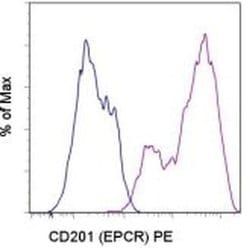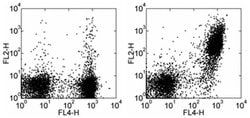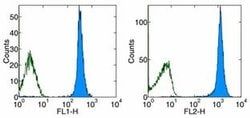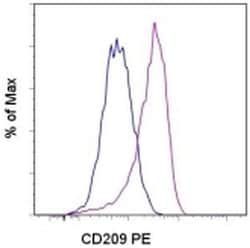50-107-12
CD201 (EPCR) Monoclonal Antibody (eBio1560 (1560)), PE, eBioscience™, Invitrogen™
Manufacturer: Fischer Scientific
Select a Size
| Pack Size | SKU | Availability | Price |
|---|---|---|---|
| Each of 1 | 50-107-12-Each-of-1 | In Stock | ₹ 13,439.00 |
50-107-12 - Each of 1
In Stock
Quantity
1
Base Price: ₹ 13,439.00
GST (18%): ₹ 2,419.02
Total Price: ₹ 15,858.02
Antigen
CD201 (EPCR)
Classification
Monoclonal
Concentration
0.2 mg/mL
Formulation
PBS with 0.09% sodium azide; pH 7.2
Gene Accession No.
Q64695
Gene Symbols
Procr
Purification Method
Affinity chromatography
Regulatory Status
RUO
Gene ID (Entrez)
19124
Content And Storage
4° C, store in dark, DO NOT FREEZE!
Form
Liquid
Applications
Flow Cytometry
Clone
eBio1560 (1560)
Conjugate
PE
Gene
Procr
Gene Alias
Activated protein C receptor; AI325044; APC receptor; bA42O4.2; CCCA; CCD41; CD antigen CD201; CD201; CD201 antigen; cell cycle, centrosome-associated protein; centrocyclin; Centrosomal protein CCD41; endothelial cell protein C receptor; Endothelial protein C receptor; Epcr; PROCR; protein C receptor; protein C receptor, endothelial
Host Species
Rat
Quantity
25 μg
Primary or Secondary
Primary
Target Species
Mouse
Product Type
Antibody
Isotype
IgG2b κ
Related Products
Description
- Description: The eBio1560 monoclonal antibody reacts with mouse Endothelial Protein C Receptor (EPCR, CD201), a 25 kDa Type 1 transmembrane protein expressed on endothelial cells
- EPCR exhibits sequence and structural homology with the MHC class I/CD1 family of proteins
- EPCR is a ligand for Protein C and plays an important role in augmenting Protein C activation by the thrombin-thrombomodulin complex and in regulating blood coagulation and inflammation
- Deletion of EPCR results in embryonic lethality, at least partically due to placental thrombosis
- Recently, it was demonstrated that EPCR expression identified cells in the bone marrow that are capable of hematopoietic reconstitution activity comparable to hematopoietic stem cells isolated with conventional methods
- The eBio1560 monoclonal antibody can be used for the detection of these hematopoietic stem cells, however the eBiomRCR-16 monoclonal antibody should only be used for the detection of CD201 on endothelial cells
- Applications Reported: This eBio1560 (1560) antibody has been reported for use in flow cytometric analysis
- Applications Tested: This eBio1560 (1560) antibody has been tested by flow cytometric analysis of the bEnd.3 cell line
- This can be used at less than or equal to 1 μg per test
- A test is defined as the amount (μg) of antibody that will stain a cell sample in a final volume of 100 μL
- The protein encoded by this gene is a receptor for activated protein C, a serine protease activated by and involved in the blood coagulation pathway
- The encoded protein is an N-glycosylated type I membrane protein that enhances the activation of protein C
- Mutations in this gene have been associated with venous thromboembolism and myocardial infarction, as well as with late fetal loss during pregnancy.
Compare Similar Items
Show Difference
Antigen: CD201 (EPCR)
Classification: Monoclonal
Concentration: 0.2 mg/mL
Formulation: PBS with 0.09% sodium azide; pH 7.2
Gene Accession No.: Q64695
Gene Symbols: Procr
Purification Method: Affinity chromatography
Regulatory Status: RUO
Gene ID (Entrez): 19124
Content And Storage: 4° C, store in dark, DO NOT FREEZE!
Form: Liquid
Applications: Flow Cytometry
Clone: eBio1560 (1560)
Conjugate: PE
Gene: Procr
Gene Alias: Activated protein C receptor; AI325044; APC receptor; bA42O4.2; CCCA; CCD41; CD antigen CD201; CD201; CD201 antigen; cell cycle, centrosome-associated protein; centrocyclin; Centrosomal protein CCD41; endothelial cell protein C receptor; Endothelial protein C receptor; Epcr; PROCR; protein C receptor; protein C receptor, endothelial
Host Species: Rat
Quantity: 25 μg
Primary or Secondary: Primary
Target Species: Mouse
Product Type: Antibody
Isotype: IgG2b κ
Antigen:
CD201 (EPCR)
Classification:
Monoclonal
Concentration:
0.2 mg/mL
Formulation:
PBS with 0.09% sodium azide; pH 7.2
Gene Accession No.:
Q64695
Gene Symbols:
Procr
Purification Method:
Affinity chromatography
Regulatory Status:
RUO
Gene ID (Entrez):
19124
Content And Storage:
4° C, store in dark, DO NOT FREEZE!
Form:
Liquid
Applications:
Flow Cytometry
Clone:
eBio1560 (1560)
Conjugate:
PE
Gene:
Procr
Gene Alias:
Activated protein C receptor; AI325044; APC receptor; bA42O4.2; CCCA; CCD41; CD antigen CD201; CD201; CD201 antigen; cell cycle, centrosome-associated protein; centrocyclin; Centrosomal protein CCD41; endothelial cell protein C receptor; Endothelial protein C receptor; Epcr; PROCR; protein C receptor; protein C receptor, endothelial
Host Species:
Rat
Quantity:
25 μg
Primary or Secondary:
Primary
Target Species:
Mouse
Product Type:
Antibody
Isotype:
IgG2b κ
Antigen: CD201 (EPCR)
Classification: Monoclonal
Concentration: 0.2 mg/mL
Formulation: PBS with 0.09% sodium azide; pH 7.2
Gene Accession No.: Q64695
Gene Symbols: Procr
Purification Method: Affinity chromatography
Regulatory Status: RUO
Gene ID (Entrez): 19124
Content And Storage: 4° C, store in dark, DO NOT FREEZE!
Form: Liquid
Applications: Flow Cytometry
Clone: eBio1560 (1560)
Conjugate: PE
Gene: Procr
Gene Alias: Activated protein C receptor; AI325044; APC receptor; bA42O4.2; CCCA; CCD41; CD antigen CD201; CD201; CD201 antigen; cell cycle, centrosome-associated protein; centrocyclin; Centrosomal protein CCD41; endothelial cell protein C receptor; Endothelial protein C receptor; Epcr; PROCR; protein C receptor; protein C receptor, endothelial
Host Species: Rat
Quantity: 100 μg
Primary or Secondary: Primary
Target Species: Mouse
Product Type: Antibody
Isotype: IgG2b κ
Antigen:
CD201 (EPCR)
Classification:
Monoclonal
Concentration:
0.2 mg/mL
Formulation:
PBS with 0.09% sodium azide; pH 7.2
Gene Accession No.:
Q64695
Gene Symbols:
Procr
Purification Method:
Affinity chromatography
Regulatory Status:
RUO
Gene ID (Entrez):
19124
Content And Storage:
4° C, store in dark, DO NOT FREEZE!
Form:
Liquid
Applications:
Flow Cytometry
Clone:
eBio1560 (1560)
Conjugate:
PE
Gene:
Procr
Gene Alias:
Activated protein C receptor; AI325044; APC receptor; bA42O4.2; CCCA; CCD41; CD antigen CD201; CD201; CD201 antigen; cell cycle, centrosome-associated protein; centrocyclin; Centrosomal protein CCD41; endothelial cell protein C receptor; Endothelial protein C receptor; Epcr; PROCR; protein C receptor; protein C receptor, endothelial
Host Species:
Rat
Quantity:
100 μg
Primary or Secondary:
Primary
Target Species:
Mouse
Product Type:
Antibody
Isotype:
IgG2b κ
Antigen: CD209 (DC-SIGN)
Classification: Monoclonal
Concentration: 5 μL/Test
Formulation: PBS with 0.2% BSA and 0.09% sodium azide; pH 7.2
Gene Accession No.: Q9NNX6
Gene Symbols: CD209
Purification Method: Affinity chromatography
Regulatory Status: RUO
Gene ID (Entrez): 30835
Content And Storage: 4° C, store in dark, DO NOT FREEZE!
Form: Liquid
Applications: Flow Cytometry
Clone: eB-h209
Conjugate: PE
Gene: CD209
Gene Alias: CD209; CD209 antigen; CD209 antigen-like protein A; CD209 molecule; Cd209a; CD209a antigen; CD209a molecule; Cd209d; CD209d antigen; CDSIGN; Cire; CLEC4L; Clec4m; C-type lectin domain family 4 member L; C-type lectin domain family 4, member L; C-type lectin domain family 4, member M; Dcsign; DC-SIGN; DC-SIGN1; Dc-signr; DC-SIGN-related protein; Dendritic cell-specific ICAM-3-grabbing non-integrin; dendritic cell-specific ICAM-3-grabbing non-integrin 1; dendritic cell-specific intercellular adhesion molecule-3-grabbing non-integrin; dendritic cell-specific intracellular adhesion molecules (ICAM)-3 grabbing non-integrin; HIV gpl20-binding protein; MGC129965; MGC130443; RGD1561104; SIGN-R1; SIGNR5
Host Species: Rat
Quantity: 100 Tests
Primary or Secondary: Primary
Target Species: Human
Product Type: Antibody
Isotype: IgG2a κ
Antigen:
CD209 (DC-SIGN)
Classification:
Monoclonal
Concentration:
5 μL/Test
Formulation:
PBS with 0.2% BSA and 0.09% sodium azide; pH 7.2
Gene Accession No.:
Q9NNX6
Gene Symbols:
CD209
Purification Method:
Affinity chromatography
Regulatory Status:
RUO
Gene ID (Entrez):
30835
Content And Storage:
4° C, store in dark, DO NOT FREEZE!
Form:
Liquid
Applications:
Flow Cytometry
Clone:
eB-h209
Conjugate:
PE
Gene:
CD209
Gene Alias:
CD209; CD209 antigen; CD209 antigen-like protein A; CD209 molecule; Cd209a; CD209a antigen; CD209a molecule; Cd209d; CD209d antigen; CDSIGN; Cire; CLEC4L; Clec4m; C-type lectin domain family 4 member L; C-type lectin domain family 4, member L; C-type lectin domain family 4, member M; Dcsign; DC-SIGN; DC-SIGN1; Dc-signr; DC-SIGN-related protein; Dendritic cell-specific ICAM-3-grabbing non-integrin; dendritic cell-specific ICAM-3-grabbing non-integrin 1; dendritic cell-specific intercellular adhesion molecule-3-grabbing non-integrin; dendritic cell-specific intracellular adhesion molecules (ICAM)-3 grabbing non-integrin; HIV gpl20-binding protein; MGC129965; MGC130443; RGD1561104; SIGN-R1; SIGNR5
Host Species:
Rat
Quantity:
100 Tests
Primary or Secondary:
Primary
Target Species:
Human
Product Type:
Antibody
Isotype:
IgG2a κ
Antigen: CD213a1 (IL-13Ra1)
Classification: Monoclonal
Concentration: 0.2 mg/mL
Formulation: PBS with 0.09% sodium azide; pH 7.2
Gene Accession No.: O09030
Gene Symbols: IL13RA1
Purification Method: Affinity chromatography
Regulatory Status: RUO
Gene ID (Entrez): 16164
Content And Storage: 4° C, store in dark, DO NOT FREEZE!
Form: Liquid
Applications: Flow Cytometry
Clone: 13MOKA
Conjugate: PE
Gene: IL13RA1
Gene Alias: AI882074; Cancer/testis antigen 19; CD antigen CD213a1; CD213a1; CD213a1 antigen; CT19; IL13 receptor alpha-1 chain; IL-13 receptor subunit alpha-1; IL13R; IL-13R subunit alpha-1; IL-13r[a]; IL13RA; IL-13Ra; IL13RA1; IL-13RA1; IL-13R-alpha-1; interleukin 13 receptor subunit alpha 1; interleukin 13 receptor, alpha 1; interleukin 13 receptor, alpha 1-like; interleukin-13 receptor subunit alpha-1; Interleukin-13-binding protein; LOC100360218; Novel cytokine receptor 4; NR4
Host Species: Rat
Quantity: 25 μg
Primary or Secondary: Primary
Target Species: Mouse
Product Type: Antibody
Isotype: IgG2a κ
Antigen:
CD213a1 (IL-13Ra1)
Classification:
Monoclonal
Concentration:
0.2 mg/mL
Formulation:
PBS with 0.09% sodium azide; pH 7.2
Gene Accession No.:
O09030
Gene Symbols:
IL13RA1
Purification Method:
Affinity chromatography
Regulatory Status:
RUO
Gene ID (Entrez):
16164
Content And Storage:
4° C, store in dark, DO NOT FREEZE!
Form:
Liquid
Applications:
Flow Cytometry
Clone:
13MOKA
Conjugate:
PE
Gene:
IL13RA1
Gene Alias:
AI882074; Cancer/testis antigen 19; CD antigen CD213a1; CD213a1; CD213a1 antigen; CT19; IL13 receptor alpha-1 chain; IL-13 receptor subunit alpha-1; IL13R; IL-13R subunit alpha-1; IL-13r[a]; IL13RA; IL-13Ra; IL13RA1; IL-13RA1; IL-13R-alpha-1; interleukin 13 receptor subunit alpha 1; interleukin 13 receptor, alpha 1; interleukin 13 receptor, alpha 1-like; interleukin-13 receptor subunit alpha-1; Interleukin-13-binding protein; LOC100360218; Novel cytokine receptor 4; NR4
Host Species:
Rat
Quantity:
25 μg
Primary or Secondary:
Primary
Target Species:
Mouse
Product Type:
Antibody
Isotype:
IgG2a κ





